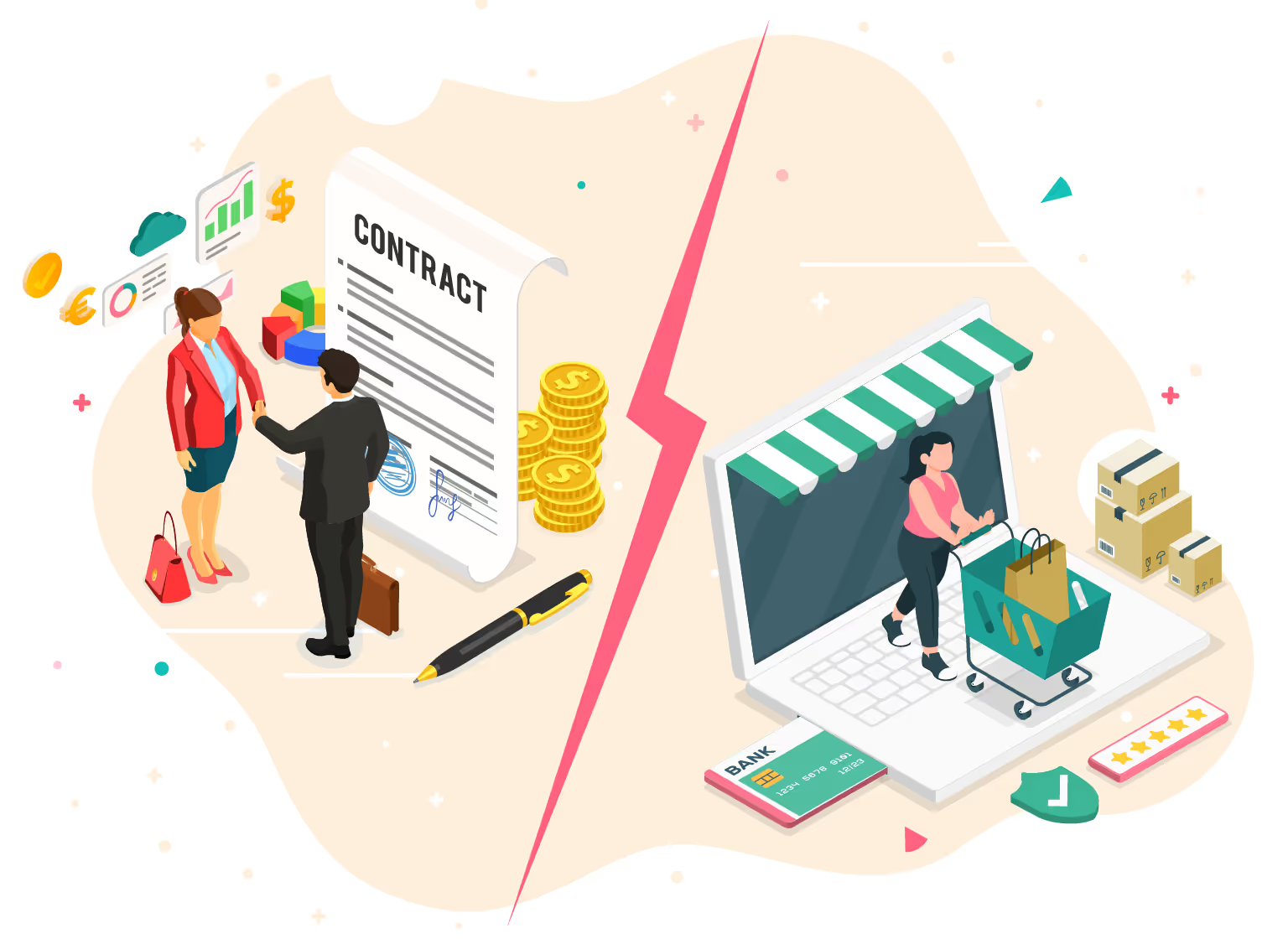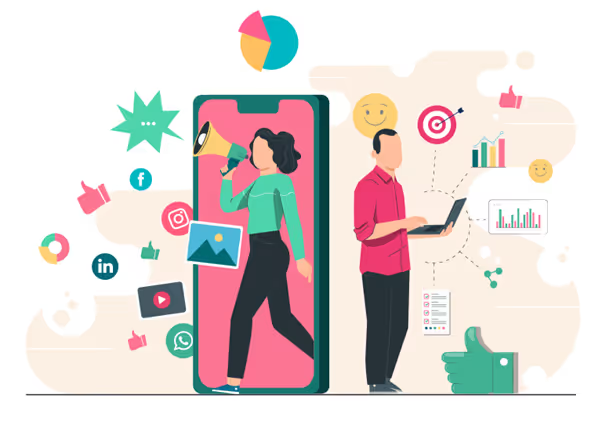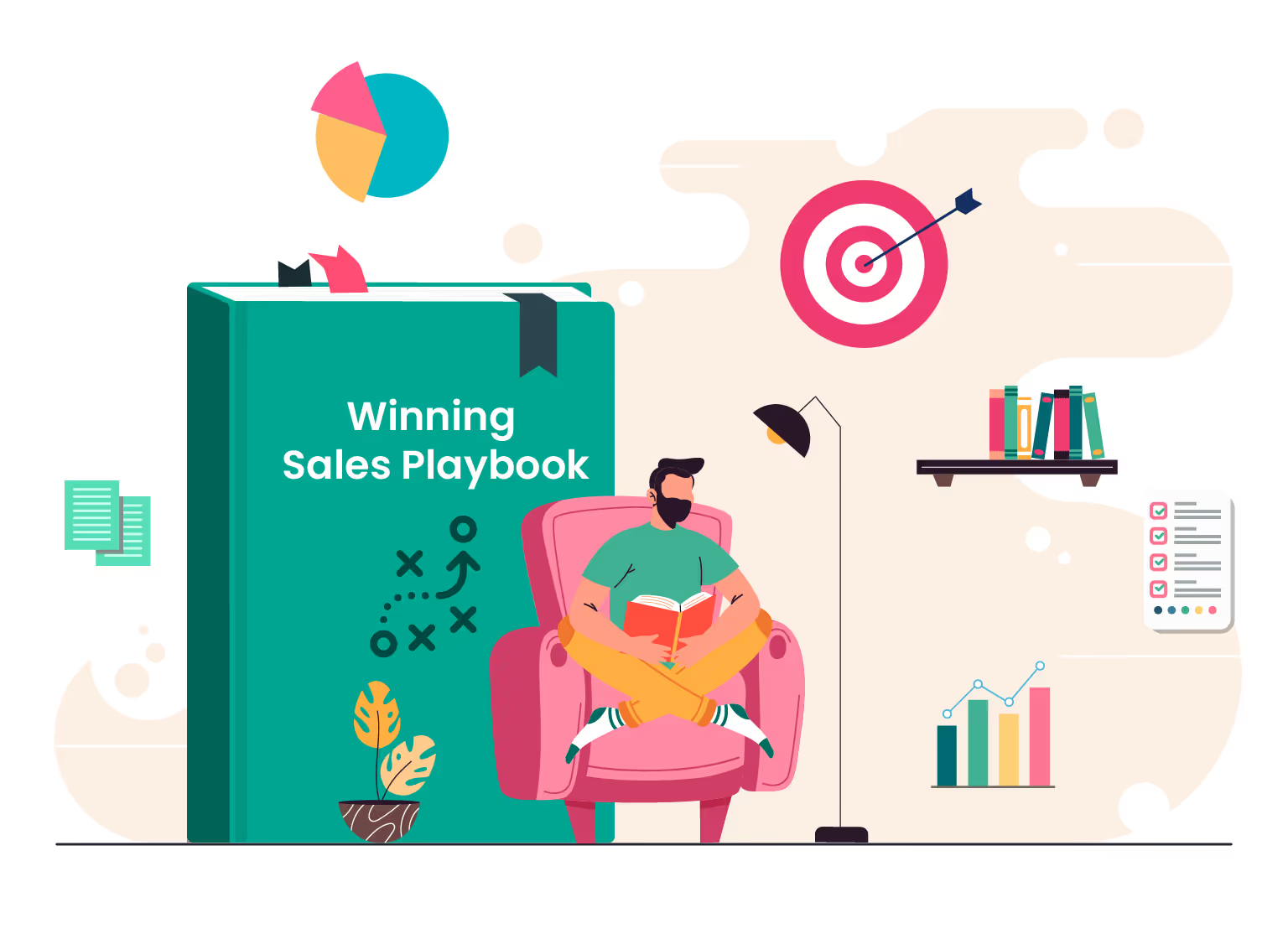
Blog
What Is the Difference Between B2B and B2C Sales?
December 12, 2023


Key Insights
Selling to an organization and an individual involves varying approaches and strategies.
Approaching an organization with a sales pitch requires a niche and focused marketing and sales strategy that can attract their attention. Selling a common product to a wider demographic demands a different sales and marketing approach.
To meet these specifications and requirements businesses must take into account various factors that influence their sale.
In this article, we will explore these differences by understanding the B2B and B2C sales models and their differences.
So scroll down for more.
What Is B2B Sales?
Business-to-business (B2B) sales involve the sale of products or services from one business to another. The sales model caters to other businesses, particularly in industries where their solution supports the operational needs of other enterprises.
In this dynamic landscape, the B2B sales pipeline plays a pivotal role, guiding businesses through lead generation, prospect qualification, and the strategic nurturing of client relationships to ensure seamless transactions and sustained success.
Examples of B2B industries include manufacturing, technology, consulting, and wholesale distribution, among others. B2B sales can take place through various channels, including direct sales teams, online platforms, and third-party distributors.

What Is B2C Sales?
Business-to-consumer sales refers to the process of selling products or services directly to individual consumers. In a B2C sales model, businesses focus on reaching and appealing to a broad consumer market. The transactions typically involve smaller order volumes and are characterized by a shorter sales cycle compared to B2B sales.
Examples of B2C industries include retail, apparel, electronics, food and beverages, and entertainment. Businesses in the B2C sector need to understand consumer behavior, preferences, and trends to effectively market and sell their products or services.
Utilizing a sales funnel template, B2C enterprises can strategically guide consumers through the awareness, consideration, and decision-making stages, optimizing their approach for a seamless and personalized customer journey.
Differences between B2B vs B2C sales
B2B sales vs B2C sales are distinct models with differences in their target audiences, sales processes, decision-making dynamics, and marketing strategies. In the realm of B2B sales, particularly in industries leveraging software-as-a-service (SaaS), the landscape is further shaped by specialized strategies, often referred to as B2B SaaS marketing, which focuses on showcasing the unique value propositions and addressing the specific needs of businesses in the software sector.
Here are some key differences between B2B and B2C sales:

Target Audience
In B2B sales, the target customers are other businesses and organizations where typically decision-makers are within the company, such as procurement managers, executives, or department heads. While in B2C sales the targets are individual customers and the focus is on meeting the needs and preferences of individual buyers.
Purchase Volume
Businesses often buy products or services in bulk to support their operations. Hence B2B sales involve larger purchase volume and transactions. B2C sales have smaller transaction volumes and individual consumers purchase products or services for personal use.
Sales Cycle
B2B sales generally have a longer and more complex sales cycle where the decision-making involves multiple stakeholders. The process may include negotiations, demonstrations, and customization to meet business needs. B2C sales typically have a shorter sales cycle where consumers often make quicker purchasing decisions based on personal preferences, emotions, and immediate needs.
Decision-Making Process
B2B sales are a more complex decision-making process with multiple decision-makers, such as executives, managers, and technical experts. B2C sales have a single decision-maker i.e., the individual consumer. The decision is influenced by personal preferences, emotions, and individual needs.
Relationships
B2B Sales focuses on building long-term relationships where trust, reliability, and ongoing collaboration are crucial for success. In B2C sales consumers may choose different brands based on changing preferences. While brand loyalty is important, individual consumer transactions may not always lead to long-term relationships.
Marketing Strategies
B2B sales have targeted marketing aimed at businesses. The marketing messages focus on the value proposition, efficiency, and how the product or service can address business challenges. While B2C sales utilize mass marketing strategies to reach a broad consumer audience. Here emotional appeals and lifestyle marketing help connect with individual consumers.
Customer Interaction
B2B sales often involve direct interactions between sales representatives and business clients. B2C Sales has a combination of direct interactions and online transactions as e-commerce platforms have become a significant channel for B2C sales.
Payment Methods
In B2B sales the payment terms and methods are often negotiated between businesses. While in B2C sales consumers typically make immediate payments, either online or in-store, using various payment methods.
Understanding these differences helps businesses to tailor their sales and marketing strategies effectively based on whether they are opeUnderstanding these differences helps businesses to tailor their sales and marketing strategies effectively based on whether they are operating in a B2B or B2C context.
Implementing a sales pipeline calculator in the B2B context can provide valuable insights into the sales cycle, aiding in better resource allocation and strategic decision-making.
For further reading, check How B2B Sales Automation is Reshaping the Business Landscape.
Conclusion
In the dynamic world of commerce, the distinction between B2B and B2C sales serves as a guiding principle that helps shape the intricacies of business and strategize for growth and success. Embracing the advancements in technology, B2B sales automation further enhances efficiency, streamlining processes, and enabling businesses to automate repetitive tasks for a more seamless and productive sales cycle.
The B2B landscape emphasizes tailored solutions that cater to a niche demographic and sees businesses as clients. Their sales cycle is longer with the decision-making process involving multiple stakeholders, and transactions of substantial volume.
The success of B2B sales is based on the strength of the partnerships and the value addition the solution has in the client's business operations.
On the other hand, B2C is directly involved with individuals as consumers. The sale is based on personal preferences, emotional connections, and the ever-evolving dance of brand loyalty.
B2B and B2C offer possibilities to businesses; their success depends on the ability to connect, empathize, and deliver value to the customer while engaging in the art of meeting needs, solving challenges, and leaving lasting impressions.
To read more about sales-related topics, connect with Kennect. For more information, Book A Demo NOW!
ReKennect : Stay ahead of the curve!
Subscribe to our bi-weekly newsletter packed with latest trends and insights on incentives.
Thank you! Your submission has been received!
Oops! Something went wrong while submitting the form.
Your data is in safe hands. Check out our Privacy policy for more info















